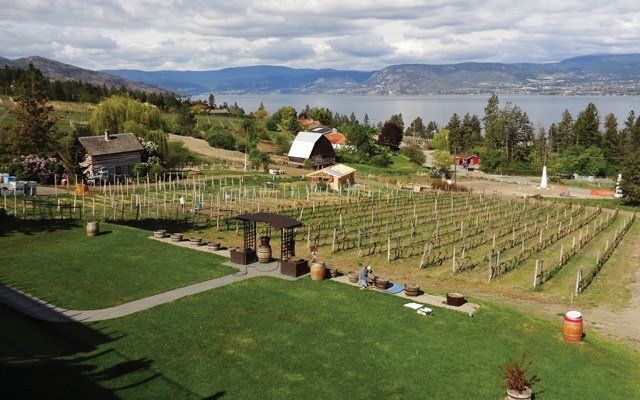April is Earth Month. It's been 27 years since the launch of International Earth Day in 1990, so with that in mind we take quick look at the state of green wine in British Columbia.
The sustainable/organic/biodynamic/natural wine debate goes on daily. Is the wine quality better? Is it worth the extra cost and, believe it or not, some ask is organic environmentally friendly? There are those who would argue that organic viticulture takes twice as much manpower in the vineyard and, if they all drive cars to work, well, how sustainable is that?
Certification is equally as contentious as in, by whom, using what standards and who is inspecting the farms.
No matter how you view the subject there is something about organics that brings out the best and worst in people, especially those who see the world in black and white. I liked Jancis Robinson's take on the issue speaking to the Grape Collective online: "The quality of natural wine across the board is going up and the number of horrors is going down. The only thing I don't approve of is the 'all or nothing' mentality, and the zealotry that sometimes attaches itself to natural wine." You could add organics and biodynamic to that.
I think any level of conservation and responsibility is a good thing, and often it leads to greater responsibility. I remember talking with a Chilean winery in the early 2000s that started by fixing all their leaking hose bibs and taps. It was a simple message to the employees that wasting water was not to be tolerated, but the bigger message was about taking responsibility for the environment around them.
In fact, today studies have shown there is no single way to save the Earth and that in any workplace there can be many different views as to what is sustainable. We need to encourage all of them if we are going to come out the other end leaving what we have been given in better shape than when we received it.
Sandra Oldfield is the CEO of Tinhorn Creek in the Okanagan Valley and a leader in the winery sustainability field in North America. Her take is succinct: "We are stewards of the land and our relationships with them; people rely on us for their livelihoods and trust us to keep them safe; we must reduce our production of carbon; and conserve the use of water, preserving the integrity of our watersheds."
At Summerhill Winery, CEO Ezra Cipes is a huge proponent of organic and bio-dynamic farming and perhaps even more interesting, the notion of permaculture or sustainable land-use design where you plan human settlements and agricultural systems that mimic the relationships found in natural ecologies. According to Cipes, "Within a permaculture system, work is minimized, wastes become resources, productivity and yields increase, and environments are restored."
The bigger picture globally is at the grassroots level where many individuals are taking up the challenge and instituting environmentally responsible agriculture and wine production. When you see winery personnel turning off leaking water taps in Chile, or recycling water in Sonoma, or pulling out non-indigenous plants in South Africa, or using solar energy in Australia, you get the sense they believe change is not only possible but they can be part of it.
You can't certify caring, but as consumers become familiar with wines that are either certified organic or sustainable, and are recommended by those in the know, the culture will change.
This month, we offer a top-10 list of Earth-friendly labels. Now if only retailers would make them easier to find in the store, we too could do our part to help improve the environment.
Torres Vina Esmeralda Moscatel-Gewürztraminer 2014, Catalunya, Spain ($15.99) — exotic, spicy/limey litchi fruit flavours that work well with turkey or a favourite curry dish.
Tinhorn Creek Gewürztraminer 2015, Okanagan Valley, British Columbia, Canada ($15.99) — hints of ginger-scented oil and rich gooseberry, litchi and peach flavours. Super value.
Château Rigaud Faugères Organic, Coteaux du Languedoc, France ($22.99) — floral, black fruit with a spicy licorice undercurrent. Perfect with grilled lamb.
Haywire Switchback Wild Ferment Organic Vineyard 2014, Okanagan Valley, British Columbia ($23.00) — organically farmed, wild-fermented with pear, sea salt and redcurrant notes. Halibut is the match.
Domaine Lafond Tavel Roc-Epine 2015, Rhone Valley, France ($23.99) — look for a wild cherry, ripe pear and red liquorice rosé with some cinnamon bark spicing. Try this with a veal or pork chop.
Summerhill Cipes Brut N/V, Okanagan Valley, British Columbia, Canada ($24.99) — tangy blend of riesling, chardonnay and pinot blanc with floral, creamy, baked apple, mineral, citrus, rhubarb flavours. Try with assorted appetizers.
Emiliana Coyam 2013, Valle del Colchagua, Valle del Rapel, Chile ($27.99) — has an aromatic nose with blackberries, violets and chocolate flavours. A delicious blend of biodynamic syrah, carmenère, merlot, cabernet sauvignon, mourvèdre and malbec.
Domaine Zind-Humbrecht Muscat Turckheim 2014, Alsace, France ($32.99) — bone dry, this aromatic, fruity white dances on the palate. Asparagus, anyone?
Little Farm Winery Riesling 2015, Cawston, Similkameen Valley, British Columbia ($30.00) — fresh lime pith, white grapefruit, green apple, river stones and chalk. Perfect with pork.
Narrative Ancient Method by Okanagan Crush Pad 2015, Okanagan Valley, British Columbia ($39.90) — soft and juicy, bubbly if a touch crude, yet complex and delicious in the back end delivering all the fruit you want.
Anthony Gismondi is a globetrotting wine writer who makes his home in West Vancouver, British Columbia. For more of his thoughts on wine log onto www.gismondionwine.com.




